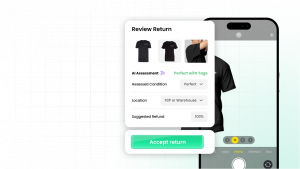A Canadian technology start-up company has developed a powerful returns management platform that can help clothing brands and online retailers reduce the number of fraudulent returns they get, the number of online refunds they issue, and the amount of waste sent to landfills.
With Waste Reduction Week almost upon us, that last point may be the most timely and important for eco-conscious companies and consumers worried about how we treat the environment.
Recent studies show retailers sent nearly 10 billion pounds of returned products to landfill in 2022. Ironically, perhaps insanely, it seems it can be more cost-effective to dump the stuff than resell it.
With significant increases in online shopping over the years, and the expected easy return policy most consumers now assume comes with their purchase (nearly half of retailers offer free returns to attract customers), retailers are facing increased return costs from shipping and repackaging. The rise of ‘bracket shopping’ means people are purposely buying multiple sizes and colours of the same product with the intention of returning some. And then there’s those reports of growing return fraud, be it via worn products, wrong products or even no products in the return box. So it’s a problem for those worried about the bottom line, too.
The same report (links to pdf) said that in 2021, returns accounted for an average of 16.6% of total U.S. retail sales – a cost of $4.583 trillion! The fashion industry recorded the highest returns, with customers sending back up to 40 per cent of the garments they purchased.
Seeing the need to transform the retail returns process, a Toronto-based technology start-up called Frate has now raised more than $5 million (CDN) in total funding to expand operations and further develop its automated returns platform, one that optimizes the return and exchange process for brands of all sizes.

Frate CEO Bailey Newton.
Led by CEO Bailey Newton, Frate has already implemented notable features in its platform, among them personalized exchange recommendations, AI-powered virtual condition assessment, and peer-to-peer returns. The company reports that clients who use its platform see a 35 per cent decrease in returns to their warehouses (and a corresponding reduction in associated shipping costs and vehicle emissions).
The tech company’s retail clothing and apparel partners currently include the billion-dollar Brazilian footwear giant Arezzo&Co (parent company of Schutz, Alexandre Birman, and Arezzo), Peace Collective, Honey, Canada Pooch, and Felina.
But Newton laughs when he describes the first ‘partner’: his Mom.
The idea for Frate came to him as he saw clothing boxes piling up in her home after yet another online shopping spree. “She’d order two or three things, each in a different colour and size. She’d hold it up, try it on, put it back and the box would sit there.”
It’s not a new discovery, he knows, but to any analytical person, his Mom times millions of other online shoppers, means brands are losing out. Products in the returns process are depreciating. The costs of shipping back and forth, the costs of repackaging and reshipping the product to another customer. “It’s inefficient and wasteful,” Newton says.
Likewise, the not-so-new idea of peer-to-peer selling and shipping of a product (unwanted by one customer but known to be desired by another) was at least a partial return solution offered by other companies.

Newton and the team at Toronto tech company Frate. Frate image.
But Newton and the Frate team wanted to move beyond a simple peer-to-peer solution and come up with a full returns management platform, a sophisticated portal in which brands and retail clients could find easy-to-use tools to deal with an increasingly important returns process.
“We’re in the background,” Newton says. “We’re enabling them. They get the ‘credit’ and their customers feel better when they get the branded experience. We are white labelling it.”
Of course, straightforward peer-to-peer transactions are an option, but among the platform features, Frate has added a way to incentivize a hold on the product to better manage supply and demand. The spontaneity of the shopping experience means a buyer might not make the purchase three days later, but automated control of supply and demand ups the sales rates, with Frate reporting 40 per cent of return listings are shipped between customers.
Frate has also added AI to the returns process.
Many online shoppers know that once an online return request is scanned, the refund is issued. It’s part of the online convenience expectation, but some people take advantage. There’s no way to know what’s in the box, if the product is in good condition or it if is there at all.
“There are stories of empty boxes being returned, of worn products being returned that end up being thrown away,” Newton agrees, “so something we did is to build an AI (artificial intelligence) enabled verification tool.”

An AI (artificial intelligence)-enabled verification tool is part of the Frate retail returns management process. Frate image.
By taking a quick picture of an item for return or peer-to-peer process, and submitting it with scanned QR code, the Frate AI tool will say ‘the product is in perfect condition, take it back’ or ‘it’s not in good condition, further assessment needed before taking it back’ by algorithmically comparing it to a database of master shots. Frate says 99 per cent fewer returns are in poor condition as a result.
How to tell if a fraudster actually puts the item in the box? Well, there’s only so much the platform can do at present.
But as Newton says, “The goal is that if fraud is at ten per cent, you bring it down to one percent. That nine-point reduction is significant.
“Most brands we work with have seen a 20 per cent decease in warehouse-bound returns,” Newton itemizes. “We had one footwear customer, 40 per cent of the returns they received were coming back worn. Decrease that down to two per cent after they implemented AI verification.
“The cost savings are insane!”
And that’s just part of the story.
# # #

The Retail Council of Canada reported that returns fraud increased by 22 per cent between 2020 and 2022. The rise of e-commerce during the pandemic played a significant role in this surge, as more customers became accustomed to ordering multiple items online and returning unwanted products. Image credit: Flickr/Paul Lim
-30-



